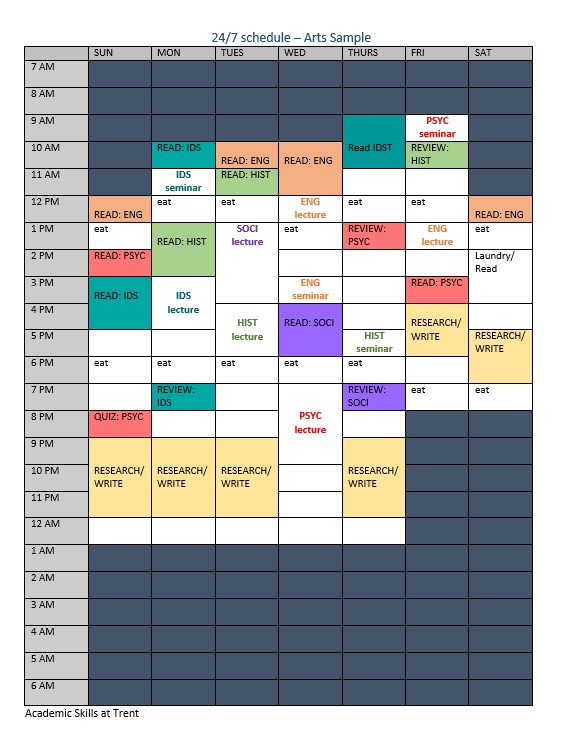Short-Term Planning
Short-term planning involves creating a weekly schedule that allows you to complete your work while balancing sleep, fun and other priorities in life. Not all routines are the same and yours can vary on the level of detail. The goal is to develop a realistic plan that helps you feel balanced and in control, making your university experience much more enjoyable!
24/7 Schedule
Creating a 24-hour schedule is an excellent way to start your planning; it helps to create structure to your days and illustrates how you use your time and how much time you have available. A 24-hour schedule sounds daunting, but it allows you to be flexible and to work at times which suit you best, whether you prefer the moonlight or early morning sun for study. Download a blank template to make your own schedule.
Sample 24/7 Schedule

How to Create a 24/7 Schedule
- Block off times for sleeping, eating, exercise, household tasks, and socializing. If you know you will be spending Friday nights out with friends, block it off – don’t try to plan to do work at a time when it is unlikely to happen. (Also consider how early you will rise the following Saturday.)
- Block off all of your class, seminar, and lab times. Consider time getting to and from classes if you have to commute or take public transit.
- Block off your paid work hours, volunteer commitments, training schedule, or program placement.
- Read the syllabus for each course and identify the weekly workload. Estimate the time you need to complete readings or practice questions, to review, or to do an online quiz. Expect to spend two to four hours per week per course for these tasks, which can be in one large block or in a few smaller blocks of time (for example, you might find it easier to focus on your psychology text book if you read it in a few 45-minute blocks instead of a 3-hour slog). Enter blocks of time for this work where there is time available (and when you are likely to do the work) in your schedule.
- Schedule in “major assignment” time each week; this may vary based on your course requirements, but many students find they need 8-10 hours weekly for research, writing, and preparation for essays, labs, projects, or exams. Each week, you can decide which major assignments you need to focus on based on your long term planning.
Two Approaches to the 24/7 Schedule
Standard Routine
You may wish to establish all of these academic and personal activities in specific blocks of time (i.e. laundry on Wednesdays, 4-6pm; reading for Bio on Thursdays 8-10pm).
Flexible Schedule
You may find it more useful to know, based on the space available in your 24/7 schedule, that you have 3 hours available on Tuesday afternoons and 4 hours on Tuesday evenings; you can then decide, on a weekly basis, what tasks fit in those time slots (i.e. this week: research for Psychology Tues. aft.; math problem set and bio pre-lab Tues. eve.).
To-Do Lists
To plan your week, day, or work period, to-do lists can be a great tool. First, take an inventory of tasks by making one big "empty the junk drawer" list. Next, prioritize and map out tasks for different days of the week. A to-do list can quickly become long and overwhelming, so download a blank to-do list template or a 2-week planner to try and consider the tips below to help you make a doable to-do list!
Sample Daily Plan/List
| Monday | Tuesday | Wednesday | |
|---|---|---|---|
| Academic |
ERS pre-lab (1hr) INDG read chp 4 (2 hrs) HIST find 4 articles for research paper (1-2 hrs) |
HIST read/sum 1 article & create citations (1.5 hrs) GEOG outline & draft 2 pgs (2.5 hrs) ERS data analysis (2 hrs) |
GEOG draft 3 pgs (2 hrs) POST read chp 3 (2.5 hrs) |
| Life |
Laundry Gym |
Work 4-8pm Groceries |
Call home Gym |
Tips for Making Your To-Do List
- When prioritizing your tasks, consider urgency and importance as well as "need-to" and "want-to" tasks. Aim for a balance to help you find sustainable progress and avoid losing focus and burning out.
- Try your best to be honest and realistic to keep your list achievable. Overestimating the time a task takes to complete can help you build in buffer time.
- Consider when you typically feel most energized during the day; try working on your toughest task at that time. For some of us, that means starting with a challenging task to get it out of the way whereas others prefer starting with a low effort-task (an "easy win"!) to spark motivation.
- If feeling overwhelmed and having trouble starting, break down tasks into small, specific steps. For example, instead of "write essay", try "read instructions, choose topic, find 3 sources".
- Consider tasks that enhance your own wellbeing and include them on your list: going for a walk, enjoying a snack, cleaning your space, etc.

